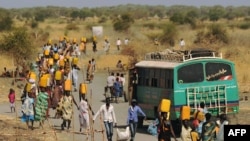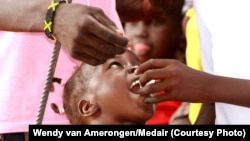Insecurity in South Sudan along with obstructions to aid delivery and a huge funding shortfall will result in a massive tragedy in the coming months in the young country, where millions face hunger as the conflict drags on, U.N. officials warned Tuesday.
“Ordinary people are bearing the brunt of this conflict and agencies like ours are facing far too many obstacles in trying to assist them," said World Food Program (WFP) chief Ertharin Cousin at the end of a two-day visit to South Sudan with the head of the U.N. refugee agency, Antonio Guterres.
During their trip, the two U.N. agency heads met with people who fled their homes during the conflict and have sought shelter in the remote town of Nyal, in Unity state.
“Women we met in Nyal who have been affected by the conflict asked us to convey three messages to the world: they need peace, assistance to relieve their suffering, and the chance for their children to return to school,” Cousin said.
The two agency chiefs discussed the crisis with President Salva Kiir and other government officials and were given the president's commitment that South Sudan will support the delivery of humanitarian assistance in the country.
More than one million people have been forced by the fighting in South Sudan to flee their homes, according to the United Nations. Some 254,600 of them fled to neighboring countries, and more than 803,000 are thought to be displaced inside South Sudan.
At least 10,000 people are thought to have died, although no precise death toll is available.
The U.N. Office for the Coordination of Humanitarian Affairs (OCHA) said in a report released Tuesday that 3.7 million people are at high risk of food insecurity in South Sudan as the heavily agriculture dependent country's planting season continues to be disrupted by ongoing clashes and insecurity.
The planting season started in mid-March and runs until mid-June, OCHA said.
Another problem facing South Sudan is a severe funding shortfall.
OCHA said in a statement that a six-month crisis response plan for South Sudan that was launched in January has only been 30 percent funded and faces a shortfall of $887 million.
WFP said it faces a funding shortfall of $224 million in South Sudan over the next six months.
Vincent Lelei, the head of OCHA in South Sudan, said insufficient funding for South Sudan will likely result in "unprecedented" suffering in the country.
"Those who don't have food will be going without food... Others will suffer from diseases. Children will be malnourished," he said.
"And in fact if it continues... and they continue to weaken from movements from here and there, the level of suffering will likely be unprecedented," Lelei told VOA.
The interview with Vincent Lelei was conducted by Mugume Davis Rwakaringi in Juba.
“Ordinary people are bearing the brunt of this conflict and agencies like ours are facing far too many obstacles in trying to assist them," said World Food Program (WFP) chief Ertharin Cousin at the end of a two-day visit to South Sudan with the head of the U.N. refugee agency, Antonio Guterres.
During their trip, the two U.N. agency heads met with people who fled their homes during the conflict and have sought shelter in the remote town of Nyal, in Unity state.
“Women we met in Nyal who have been affected by the conflict asked us to convey three messages to the world: they need peace, assistance to relieve their suffering, and the chance for their children to return to school,” Cousin said.
The two agency chiefs discussed the crisis with President Salva Kiir and other government officials and were given the president's commitment that South Sudan will support the delivery of humanitarian assistance in the country.
More than one million people have been forced by the fighting in South Sudan to flee their homes, according to the United Nations. Some 254,600 of them fled to neighboring countries, and more than 803,000 are thought to be displaced inside South Sudan.
At least 10,000 people are thought to have died, although no precise death toll is available.
The U.N. Office for the Coordination of Humanitarian Affairs (OCHA) said in a report released Tuesday that 3.7 million people are at high risk of food insecurity in South Sudan as the heavily agriculture dependent country's planting season continues to be disrupted by ongoing clashes and insecurity.
The planting season started in mid-March and runs until mid-June, OCHA said.
If it continues...the level of suffering will likely be unprecedented.Vincent Lelei, Head of UNOCHA in South Sudan
Another problem facing South Sudan is a severe funding shortfall.
OCHA said in a statement that a six-month crisis response plan for South Sudan that was launched in January has only been 30 percent funded and faces a shortfall of $887 million.
WFP said it faces a funding shortfall of $224 million in South Sudan over the next six months.
PRESS RELEASE: More funds needed in #SouthSudan. $232m is bare minimum req'd by June to prevent needs deteriorating. http://t.co/HZtKN1Pd4N
— Toby Lanzer (@tobylanzer) April 1, 2014
Toby Lanzer, the U.N.'s humanitarian coordinator for South Sudan, urged donors to make funds available without delay. He called on opposition and government forces to end the fighting in South Sudan so that humanitarian aid can get through to those in need.
“If donor funding is not made available now, we will be unable to meet the most basic needs to keep people alive or prevent a catastrophic decline in food security for millions of people at risk later in the year,” Lanzer said, warning that, without peace and help now, "an even greater tragedy" is likely to unfold in South Sudan next year.Vincent Lelei, the head of OCHA in South Sudan, said insufficient funding for South Sudan will likely result in "unprecedented" suffering in the country.
"Those who don't have food will be going without food... Others will suffer from diseases. Children will be malnourished," he said.
"And in fact if it continues... and they continue to weaken from movements from here and there, the level of suffering will likely be unprecedented," Lelei told VOA.
The interview with Vincent Lelei was conducted by Mugume Davis Rwakaringi in Juba.






